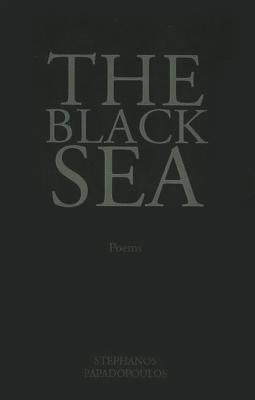Stephanos Papadopoulos
The Sheep Meadow Press ($15.95)
by Eleanor Goodman
“My great-grandfather was a Greek tobacco merchant from the city of Samsun on the Black Sea coast.” This is not a line from a prose poem, though it easily could be. It is in the introduction to Stephanos Papadopoulos’s bracing new book of poetry, The Black Sea. By turns tender, vicious, victorious, and mournful, Papadopoulos manages to make vivid a part of the world few of us have seen—the Greece of the 1920s and ’30s. We may want to look away, but given the intensity of language and ingenuity of imagery, we cannot.
This is a book of contemporary sonnets, and Papadopoulos’s control over form and rhythm is on display. Take, for example, “Voices,” a poem near the beginning of the book:
Voices still rise from foggy hillsides
that drop and fade into the shore of this Black Sea,
sulfurous and dead beneath the upper zone of life
where fish once roiled in silver clouds
and one too many mythic rivers met
in water ringed by mountains without names
The first line, a double trochee-iamb divided by an unstressed syllable, leads slowly into the pure iambs that begin midway through the third line. This iambic rhythm takes us by the hand and brings us to these “mythic rivers” and “mountains without names,” that is to say, the land of fantasy. Moments like these are many, yet Papadopoulos is careful not to straightjacket his verse in unnatural patterns.
Similarly, we do not spend too long in this lovely world of “silver clouds” of fish. The subject here is war and its many cruel effects, and though framed as an exploration of mid-20th-century Greece, this book is vitally relevant our world today. The empathy of the poet is widely encompassing, and he doesn’t flinch from ugliness:
I’ve spread these thighs for seven armies
and when they come to fuck the flags are gone.
I’ve seen a thousand pricks that look the same to me.
But what do I know, a whore in a broken world?
A little hash for better dreams is all I want
and a jar of rosewater for my hair.
Let them un-conjure their fat wives when they heave inside me.
I’m paid and they’ll soon be dead, we’ll all be gone
and these fields will grow wild with poppies
always faithful to the color red.
These lines are from “The Circassian Whore,” a poem that springs to life in its less-than-lyrical language, as well as the stark picture it paints of defiance in the midst of hopelessness.
Papadopoulos has translated Derek Walcott into Greek, and the influence shows here: “Everything is beautiful and fatal in this port— / the doors of the Greek houses swing in the wind, / the scrape of soldiers boots scar the quiet streets.” Or from the first poem in the book, called “The Poet”:
every vista
is a lanyard over-tightened, a clothesline tied
to the olive tree and swallowed by its bark,
a dream he left that followed him in daylight,
oil lamps burning for the blind, fireflies at dawn,
pain’s logic, the lantern in the midday sun—
he dresses slowly like the hangman.
In Walcott’s verse too, the poet can become a kind of hangman: “Half my friends are dead. / I will make you new ones, said earth” (from “Sea Cane,” in Sea Grapes). Poets must constantly “kill their darlings,” but from this literary murder comes new life—that is to say, art. Papadopoulos traces a brutal story that can be applied to many regions of the world. Family, myth, and history weigh heavily, but what might easily turn overly personal or maudlin does not. The poet balances this tricky combination of fact and inference, contested histories and private experience, and creates out of the amalgam a truly powerful book.
